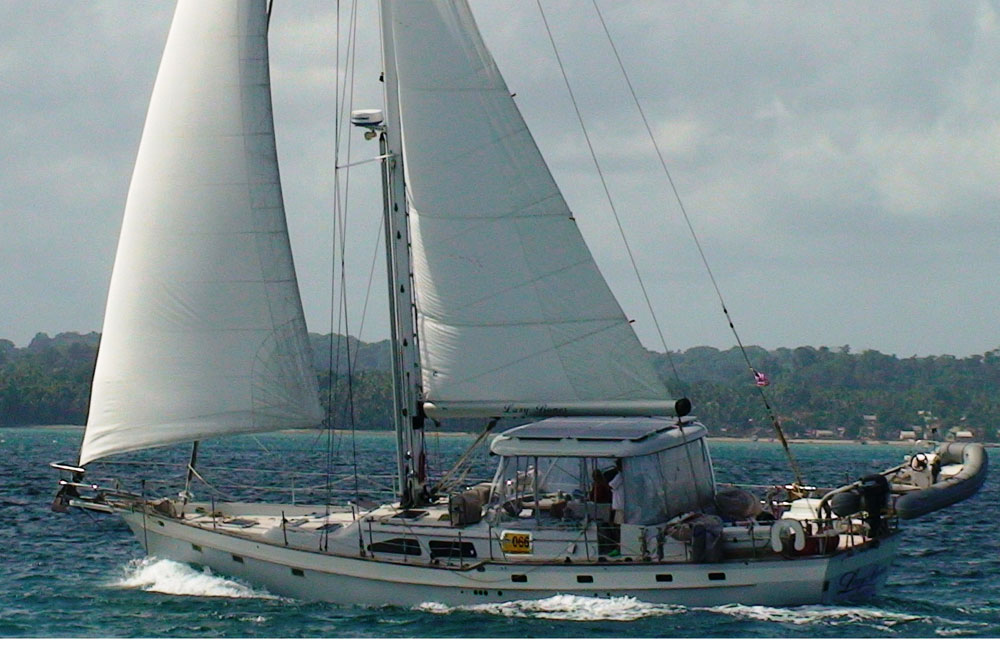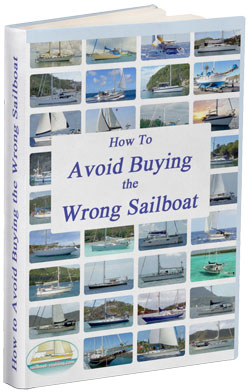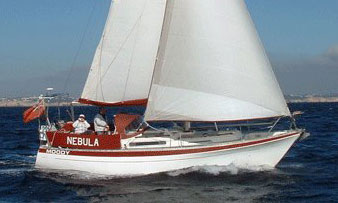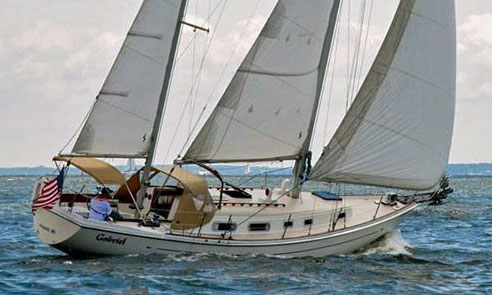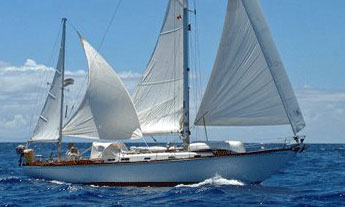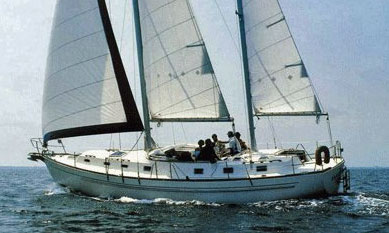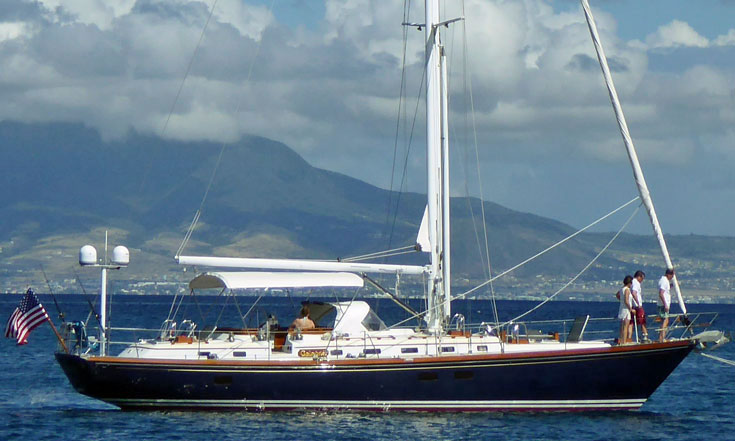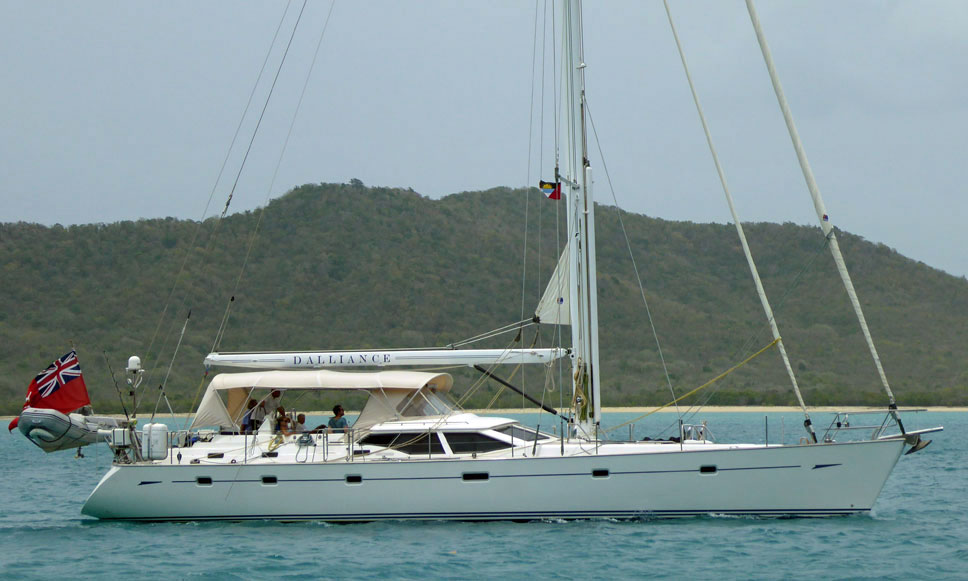- Home
- Sailboats 50'-55'
- Irwin 54
The Irwin 54 Sailboat
Specs & Key Performance Indicators
The Irwin 54, produced in both cutter and ketch formats, was designed by Ted Irwin and built in the USA by Irwin Yachts. It is a popular centre-cockpit sailboat for long-distance cruising.
Published Specification for the Irwin 54
Keel & Rudder Configuration: Stub keel with centerboard and semi-balanced rudder.
Hull Material: Fiberglass (GRP).
Length Overall: 54'0" (16.5 meters)*.
Waterline Length: 44'0" (13.4 meters)*.
Beam: 15'4" (4.7 meters)*.
Draft: 5'6" (1.7 meters)*.
Rig Type: Cutter.
Displacement: 46,000 pounds (20,865 kilograms)*.
Ballast: 16,000 pounds (7,257 kilograms)*.
Sail Area: 1,255ft2 (116.6m2)*.
Water Tank Capacity: 1,495 litres (394 US gallons, 328 imperial gallons).
Fuel Tank Capacity: 1,438 litres (379 US gallons, 316 imperial gallons).
Hull Speed: 8.9 knots.
Designer: Ted Irwin.
Builder: Irwin Yachts (USA).
Year First Built: 1988.
Year Last Built: Unknown.
Number Built: Unknown.
* Used to derive the design ratios referred to later in this article - here's how they're calculated...
Design Options & Alternative Versions
Design options:
- Rig type: The Irwin 54 was originally available in cutter and staysail ketch configurations.
- Deep or shallow draft: The standard draft is 5'6" (1.68 m). It is listed with a Keel/Centreboard hull type, which typically allows for a shallower draft with the board up and a deeper draft with the board down, offering flexibility.
- Interior layouts: While specific details on multiple interior layouts are not readily available, larger cruising yachts like the Irwin 54 often offered various interior configurations to buyers.
Alternative versions: The Irwin 54 was originally available in cutter and staysail ketch configurations. Some later models featured refinements in sail handling systems, including improved furling mechanisms and rigging layouts for easier short-handed sailing.
Sail Areas & Rig Dimensions
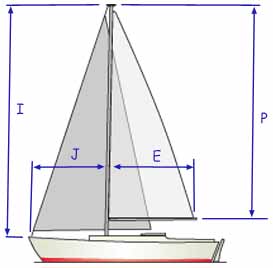 Sail Areas & Rig Dimensions
Sail Areas & Rig DimensionsThe Irwin 54, available in both cutter and staysail ketch configurations, has a total sail area of approximately 1,255ft2 (116.6m2). However, the individual sail areas depend on the specific rig setup:
- Mainsail: Around 500-600ft2 (46-56m2), depending on the rig type.
- Genoa: Typically 600-700ft2 (56-65m2).
- Staysail (for cutter rig): Approximately 200-250ft2 (18-23m2).
- Mizzen (for ketch rig): Around 200-300ft2 (18-28m2).
The rig dimensions for the Irwin 54 sailboat are as follows:
- I (Foretriangle Height): 56'6" (17.2m)
- J (Base of Foretriangle): 21'2" (6.45m)
- P (Mainsail Luff Length): 50'2" (15.3m)
- E (Mainsail Foot Length): 19'0" (5.8m)
Published Design Ratios
The Key Performance Indicators (KPIs)
- Sail Area/Displacement Ratio (15.7): This ratio indicates the boat's power relative to its weight. A value of 15.7 suggests that the Irwin 54 is not overly powered, meaning it favours ease of handling and cruising comfort over raw speed. While it may not accelerate quickly in light winds, its sail plan is sufficient for steady offshore performance.
- Ballast/Displacement Ratio (34.8): A ballast ratio of 34.8 indicates a moderate level of stability. This suggests the boat has good stiffness and can resist heeling effectively, making it comfortable for long-distance cruising.
- Displacement/Length Ratio (241): This value categorizes the Irwin 54 as a moderate displacement cruiser. It has a balance between carrying capacity and performance, meaning it can offer smooth sailing without excessive motion while still being capable of decent passage-making speeds.
- Comfort Ratio (39.9): A higher comfort ratio like 39.9 points to excellent motion comfort, making this boat well-suited for extended stays aboard and ocean crossings. This suggests that the Irwin 54 handles waves smoothly, reducing fatigue on long voyages.
- Capsize Screening Formula (1.7): With a capsize ratio of 1.7, the Irwin 54 falls well within bluewater cruising standards, meaning it is unlikely to capsize in open-ocean conditions. It is a safe choice for offshore sailing, offering security in rough seas.
Summary: The Irwin 54 is engineered as a stable, comfortable cruiser ideal for long-distance voyaging. While it prioritizes seaworthiness over high performance, it offers smooth handling, moderate speed, and excellent stability. Owners appreciate its balanced motion and safety, making it a strong choice for ocean crossings, liveaboard lifestyles, and extended cruising adventures.
But the Design Ratios are Not the Whole Story...
Design ratios are useful for comparing sailboats and predicting their performance, but they have several limitations:
1. Simplified Metrics: Design ratios reduce complex sailing dynamics into single numbers, which can oversimplify real-world performance. Factors like hull shape, weight distribution, and sail trim are not fully captured.
2. Lack of Context: These ratios do not account for sailing conditions—wind strength, wave height, and crew skill all significantly impact a boat’s behavior.
3. Static Measurements: Ratios like Displacement/Length (D/L) and Sail Area/Displacement (SA/D) assume fixed values, but real-world sailing involves changing loads, such as fuel, water, and crew weight.
4. Hull Design Influence: Two boats with identical ratios may perform very differently due to hull shape, keel type, and construction materials.
5. Rigging & Sail Plan: The ratios do not consider modern sail technology, such as furling systems, high-performance sails, or adjustable rigging, which can dramatically alter handling.
6. Comfort & Motion: While the Comfort Ratio provides insight into motion at sea, it does not fully account for ergonomics, interior layout, or livability, which are crucial for long-term cruising.
7. Capsize Screening Formula: This ratio helps assess offshore capability, but it does not factor in crew experience, storm tactics, or real-world stability in extreme conditions.
Summary: Design ratios are valuable tools for comparing boats, but they should be used alongside real-world testing, expert reviews, and personal experience to get a complete picture of a sailboat’s performance.
More Specs & Key Performance Indicators for Popular Cruising Boats
Recent Articles
-
Moody 37 Review: Specs, Performance & Cruising Analysis
Jan 23, 26 04:46 AM
A comprehensive review of the Moody 37 sailboat. Explore technical specifications, design ratios, interior layout, and performance for blue water cruising. -
Sea Wolf 40 Review: Specs, Ratios & Cruising Performance Analysis
Jan 22, 26 04:13 AM
An expert review of the Sea Wolf 40. We analyse design ratios, construction quality, and blue-water cruising capabilities for prospective owners. -
Hunter Passage 42 Sailboat: Specs, Performance & Cruising Analysis
Jan 21, 26 09:34 AM
Explore the Hunter Passage 42 sailboat. Includes detailed design ratios, performance analysis, interior layout review, and expert cruising advice for owners.
